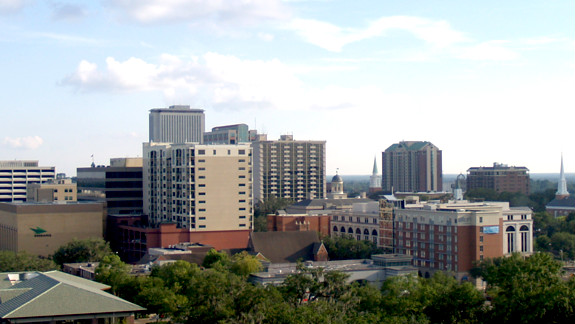
Tallahassee skyline. Photo courtesy of UrbanTallahassee via Wikicommons.
By Francisco Alvarado
Florida Center for Investigative Reporting
Even though the recently released 2014 Florida Department of Law Enforcement annual crime report shows the state’s overall crime rate dipped 4.9 percent, there is one alarming upward trend: Forcible rapes are on the rise.
In 2014, all state, county and municipal law enforcement agencies combined reported 7,104 forcible rapes, 365 more than the prior year. Yet, police across Florida only made 2,557 arrests for “forcible sex offenses” last year, 91 less than 2013, according to FDLE’s statistics.
The FBI’s uniform crime reporting program defines forcible rape as “the carnal knowledge of a female forcibly and against her will.” Police departments also log attempts to commit rape by force or threat of force as “forcible rape.”
According to the FDLE report, the city with the highest number of forcible rapes in 2014 was Tallahassee, which made national headlines this year over a 2012 sexual assault complaint against then-Florida State University star quarterback Jameis Winston that was not investigated until a year later.
The state capital, where women represent 52 percent of the 185,784 population, had 205 forcible rapes last year, according to crime information reported to FDLE by the Tallahassee and Florida State University police departments. Per capita, that’s roughly 2 women per 1,000 female residents.
For comparison, Orlando, which has a population of 252,372 people, had the second highest total of forcible rapes in 2014 with 167. Women represent 51 percent of Orlando’s population. So per capita, 1.3 women per 1,000 female residents reported being raped.
St. Petersburg, population 252,372, and Miami, population 428,107, with a 50% and 51% female population respectively, had the third and fourth highest number of reported forcible rapes with 154 and 110, respectively. But per capita, 1.2 women per 1,000 female residents reported forcible rapes in St. Petersberg and 0.5 women per 1,000 female residents reported forcible rapes in Miami.
Tallahassee is not the only college town with a high rate of forcible rapes.
Gainesville, home to the University of Florida, had 102 forcible rapes in 2014, a 65 percent spike from 62 reported the year before, according to the city’s police department. The university campus police reported four forcible rapes last year. With a female population of 62,830 that means 1.6 women per 1,000 female residents reported forcible rapes.
Spokesmen for the Tallahassee Police and victim advocates in the city did not immediately return FCIR’s requests for comment.
Gainesville Police Department spokesman Ben Tobias told the Gainesville Sun the jump in forcible rape reports was the result of a campaign encouraging victims who have been raped by someone they know to come forward.
“Our area does have a problem with alcohol and acquaintance rapes, as most college towns do,” Tobias told the Sun. “We have tried different approaches including prevention aimed toward victims and direct messages to potential offenders.”
A victim advocate who spoke with FCIR agreed with Tobias. Jesse Lazarchik, program manager for the Alachua County Victim Services And Rape Crisis Center, said the increase in forcible rape reports does not mean there has been an uptick in sexual assaults.
“We are trying to create a community where survivors of sex assault can come forward and report it,” Lazarchik said. “We deal with victims who choose to report and those who don’t. Roughly half don’t report for many reasons from being mistrustful of law enforcement to not wanting to go through the trauma of telling the story again.”
